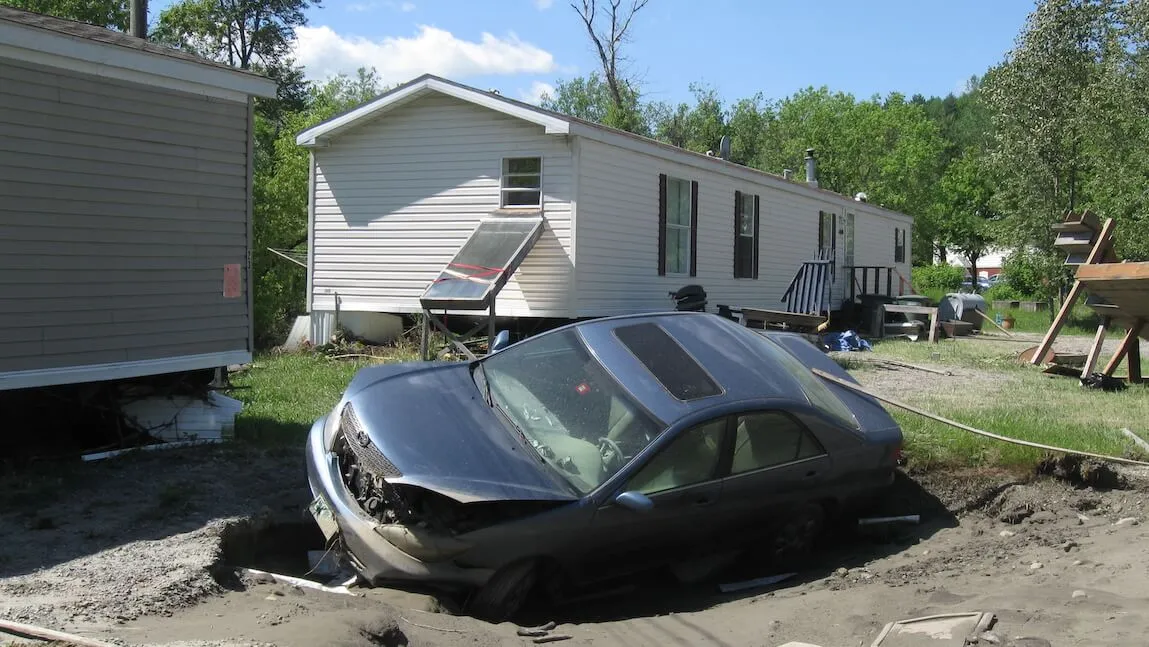BURLINGTON, Vt. — The University of Vermont is part of a new regional collaboration to study the climate-related vulnerabilities of mobile home park communities. With funding announced today from the National Oceanic and Atmospheric Association (NOAA)’s Climate Adaptation Partnership’s program, the project brings together researchers from the Universities of Vermont, New Hampshire, and Maine, as well as all three northern New England State Climatologists.
Mobile home communities are an important part of the region’s affordable housing landscape but are more likely to be impacted by risks posed by climate change such as high winds, flooding, and extreme temperatures.
Previous research from the University of Vermont found more than 20% of mobile home communities in the state are at least partially located in FEMA-mapped floodplains. During Tropical Storm Irene, mobile homes accounted for 15% of homes damaged during the storm, though mobile made up only 7% of the state’s housing stock.
“As we saw with Irene, mobile home communities are at higher risk for flooding, but with climate change also comes greater risks from extreme temperatures and other weather events,” said Kelly Hamshaw, co-principal investigator and senior lecturer in the UVM Department of Community Development and Applied Economics, who, together with fellow UVM investigator Dan Baker, has been working with mobile home communities for nearly a decade. “This collaboration will allow us to better support the resilience of these important communities, which are essential to Vermont’s housing landscape.”
Mobile homes are more difficult to heat and cool, especially older homes built prior to 1976 (before certain manufacturing and safety codes were in place), which account for a large portion of mobile homes across Vermont, New Hampshire and Maine. Rising energy costs are expected to place a greater financial burden on mobile home residents, which include some of the region’s most economically vulnerable populations.
As of 2021, there were 236 park communities in Vermont according to the Vermont Agency of Commerce and Community Development’s Annual Mobile Home Park Registry, the only such registry in the region. Working with colleagues at UNH and UMaine, Hamshaw, Baker and Vermont State Climatologist Lesley-Ann Dupigny-Giroux will use the NOAA grant to create a database of mobile home park communities in the three states and convene meetings with mobile home residents to determine climate change impacts in different ecoregions across the Northeast. The meetings will also build relationships that will support climate resilience efforts with mobile home park frontline communities.
"One of the exciting aspects of this project is the melding of the geographic traditions of climatology and the importance of place to better grasp the very pressing challenges and vulnerabilities faced by mobile home residents,” said Dupigny-Giroux, professor in the UVM Department of Geography and Geosciences. “The results of co-producing a shared appreciation for the ways in which climate change has and will continue to affect mobile home frontline communities will better allow state agencies and community partners across northern New England to better assist frontline communities as they prepare for climate change."
Dupigny-Giroux is the immediate Past President of the American Association of State Climatologists and has served as the Vermont State Climatologist for over two decades. State Climatologists are federally credentialed through NOAA to provide climate and climate change services and research to their respective states and beyond.
“We’ve learned from our earlier research in Vermont that mitigating climate risk for mobile home communities requires collaboration between residents, researchers, community groups and government agencies. It also requires sensitivity to the social and economic concerns of mobile home park residents, good data, and trust between partners,” said Baker, associate professor emeritus in the Dept. of Community Development and Applied Economics, who will lead the facilitation of stakeholder and community meetings for UVM. “We are excited about the opportunity to share knowledge and develop strategies across to strengthen the resilience of these communities across the region.”
Learn more about the study on the UMaine website.
